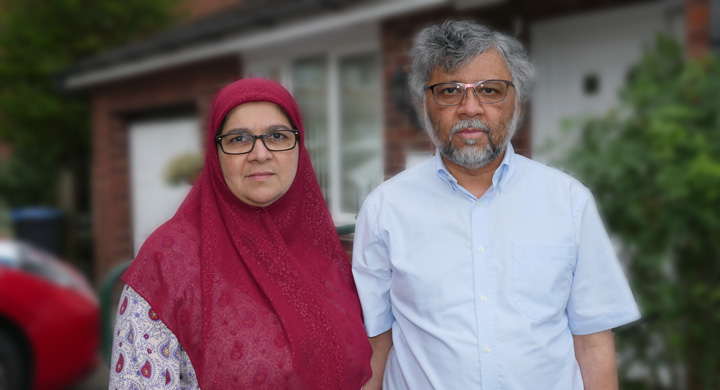In a ground-breaking judgment, with widespread implications for the press reporting of all legal proceedings, the Court of Appeal has this morning ended life-long anonymity protection for doctors in medical cases including in hugely controversial end-of-life cases. The ruling may potentially lead to the discharging of anonymity orders made in dozens of similar cases.
The practice of making life-long anonymity orders by the secretive family courts has escalated in recent times in the wake of the Charlie Gard and Alfie Evans cases where hospitals seeking to withdraw life-sustaining treatment from two babies were subject to intense public comment.
End to secrecy in family courts
Supported by the Christian Legal Centre, the parents in two such tragic cases, Dr Rashid and Dr Aliya Abbasi, and Mr Lanre Haastrup, challenged the injunctions obtained by two hospital trusts which prevented them naming the doctors responsible for the treatment of their deceased children or from speaking fully about their experiences.

The hospital trusts argued that anonymity orders were necessary to protect from media criticism the privacy interests of their clinicians, as guaranteed by article 8 of the European Convention on Human Rights. They were supported in court by the BMA, the Royal College of Nursing, the Royal College of Paediatrics and Child Health, the Faculty of Intensive Care Medicine and the Paediatric Critical Care Society who all expressed grave concerns about the effects that lifting anonymity would have on morale within the NHS and on the recruitment and retention of staff.
But Lord Burnett of Maldon, The Lord Chief Justice of England and Wales overturned the High Court judgment of the President of the Family Division Sir Andrew McFarlane, ruling that the imperatives of open justice demand that people involved in legal proceedings be publicly identified and that people caught up in disputes with the State be allowed to tell their story:
“The intense focus on the specific rights being claimed delivers the clear conclusion that the article 10 rights of the parents in wishing to “tell their story” outweigh such article 8 rights of clinicians and staff as may still be in play.”
The Court rejected that notion that the Human Rights Act obliged the grant of anonymity in these cases:
“We are aware of no Strasbourg case which has come close to allowing concerns about morale, recruitment or general well-being of health staff to provide a justification for curtailing the right to free expression about individual experiences whilst being cared for, or on matters of general public interest.”
In future such injunctions will only be permitted where there are the most compelling of grounds.
Transparency
Welcoming the judgment, Dr Rashid Abbasi and Dr Aliya Abbasi, whose daughter, Zainab died at Newcastle Upon Tyne Hospital after proceedings were initiated in 2019 to remove life-sustaining treatment, said: “Our family has suffered so much due to the actions of the hospital. As doctors ourselves we were aware of the medical gaslighting and the appalling mistreatment our daughter was subjected to but we were rendered powerless to take effective action by the injunctions the hospital obtained which served only to protect a toxic culture which puts doctors’ interests before those of their patients. The transparency which the Court of Appeal has endorsed will ensure proper accountability within the medical profession and help restore ethical standards and public trust in the NHS.”
The Abbasis have described the ‘toxic environment’ surrounding the medical care of their six-year-old daughter, Zainab, which culminated in the shocking arrest of Rashid in an intensive care unit which was captured on police body cam footage.
‘Finally there will be jusitce’
Mr Haastrup, whose infant son Isaiah suffered severe brain injuries as a result of negligence by King’s College Hospital and who died in 2018 after lengthy court proceedings initiated by the same hospital to remove his life-sustaining treatment, said: “Finally there will be justice for Isaiah, because his story can now be told. There will be justice for his parents who can now finally share their experiences with the world, and also justice for society because shining the light of truth on what happened to Isaiah will ensure that in future other families will not have to suffer what we went through.”
Andrea Williams, chief executive of Christian Legal Centre, said: “It is very reassuring that the Court of Appeal has set proper limits to the secrecy of family courts proceedings. Withdrawal of life support from a child is the gravest decision which the doctors and judges can ever make. Transparency is essential to ensure proper scrutiny of those decisions by the public and especially by the medical profession.
“We know from experience that even in cases of bitter disagreements between families and doctors, most families have a lot of praise for health professionals who had done their best for their child. There may sometimes be criticisms of particular actions by particular doctors. Even if those criticisms are sometimes unfair, the best way to dispel them is public scrutiny and open debate. Professionals who have done nothing wrong have nothing to fear from transparency.”
Watch more from the Abbasis below:

